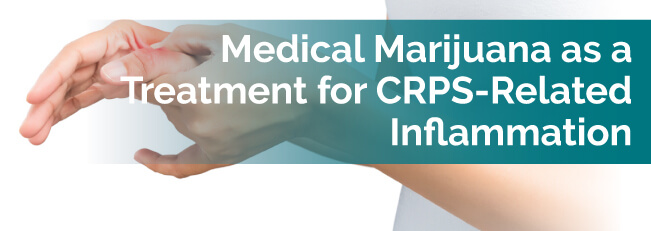
Complex regional pain syndrome, also known as CRPS, exposes your nerves to damage, making them inflamed. This inflammation makes the protective fat around your nerves extra susceptible to wearing down. By reducing the inflammation caused by CRPS, you can protect your nerves from further harm and reduce pain.
Doctors typically prescribe painkillers and anti-inflammatory medication to soothe inflamed nerves. However, more and more patients are using medical marijuana as a less harmful option.
To understand cannabis’ anti-inflammatory power, it helps to know how your body creates inflammation.
Inflammation works as an immune response to protect your body from foreign substances. It’s intended to isolate infections and germs, so they can’t affect you. However, sometimes your immune system triggers inflammation when you don’t have any foreign substances to defend against. Since inflammation causes fluid to rush to the infected area, the fluid puts pressure on your nerves, causing pain.
Cannabis’ anti-inflammatory properties have to do with the way that it interacts with your body. You have a system that specifically works with the chemicals in marijuana and similar compounds that you produce yourself. This endocannabinoid system (ECS) works naturally with the rest of your body.
Cannabinoids, or cannabis chemicals, activate receptors in your cells. The two kinds of cannabinoid receptors, CB1 and CB2, each affect different parts of your body. While the CB1 receptor affects the brain, the CB2 receptor affects the immune system.
When cannabinoids activate your CB2 receptors, the CB2 receptors send signals to the immune system. These signals suppress the immune system’s responses, reducing functions like inflammation.
Specifically, the CB2 receptor tells the immune system to send fewer inflammatory signals. By lowering the inflammatory substances released, the CB2 receptor suppresses inflammation.
Marijuana medicine works like an immunosuppressant, but without the risks of standard immunosuppressants. Most patients shouldn’t take drugs like corticosteroids for an extended period due to harmful side effects, like blood sugar issues. On the other hand, medical cannabis only causes mild short-term side effects like dry mouth, dizziness and increased appetite.
Also, you can use medical marijuana in multiple ways to suit your personal preferences. While you can still take marijuana medication in the form of a pill, many states allow patients to purchase products like edibles and tinctures.
Meet with a professional to get more information about using cannabis as an anti-inflammatory medicine. Licensed, marijuana-friendly doctors can recommend medicine based on your symptoms. Then, dispensary staff members can help you choose the right product.
Looking for more information about CRPS I, CRPS II, Causalgia, or Reflex Sympathetic Dystrophy? Check out our additional resources below: